Key takeaways:
- Feedback in communication is crucial for effective dialogue and relationship building, fostering an environment of trust and growth.
- Celebrating positive feedback enhances team morale, encourages proactivity, and strengthens team dynamics.
- Timely, specific feedback fosters a safe and open dialogue, which is essential for effective communication and improvement.
- Sharing feedback successes through storytelling and recognition cultivates a culture of appreciation and motivates continuous learning within teams.
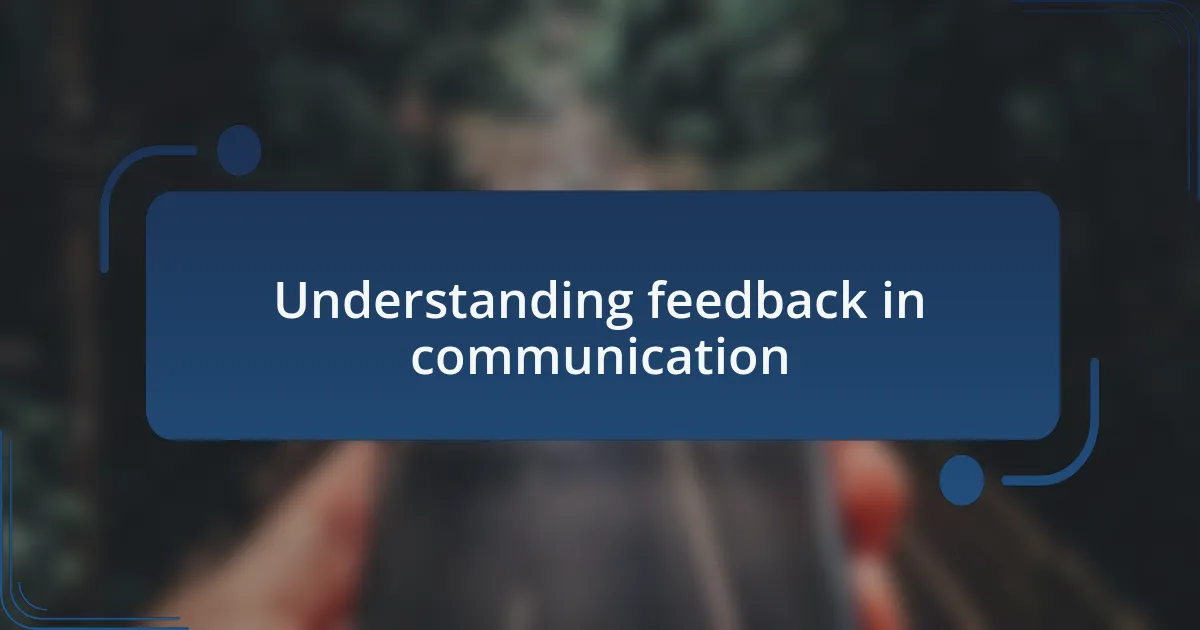
Understanding feedback in communication
Feedback in communication is essential because it acts as a mirror reflecting our effectiveness in conveying messages. I remember a time when I presented a project and received critical feedback that initially stung. But looking back, that moment transformed my approach to communication, highlighting the importance of listening to others’ perspectives.
Effective feedback serves not only to clarify but also to deepen understanding among team members. Have you ever wondered why some conversations seem to flow effortlessly while others feel strained? In my experience, it often boils down to whether feedback is communicated openly and constructively. I’ve found that when people feel safe to express their thoughts, the quality of dialogue improves significantly.
Moreover, feedback shapes the dynamic of relationships, whether personal or professional. I recall a colleague who struggled with receiving feedback positively, creating tension in our exchanges. Through patience and support, we navigated this challenge together, ultimately fostering a more collaborative environment. This taught me that understanding feedback is not just about delivering criticism or praise—it’s about building trust and encouraging growth.
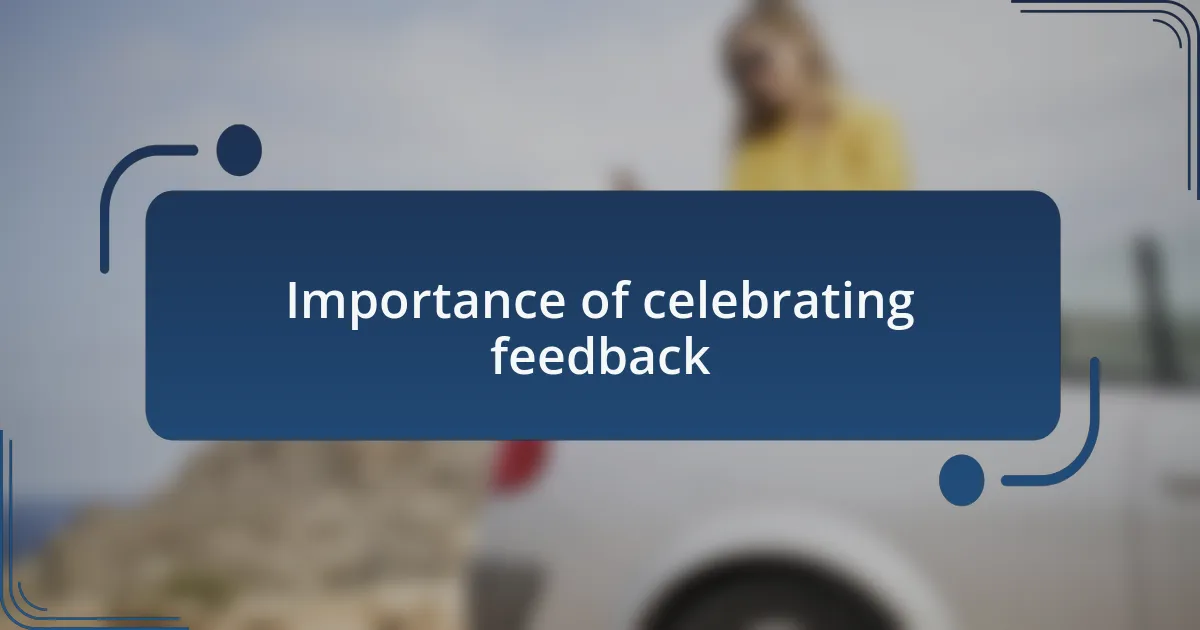
Importance of celebrating feedback
Celebrating feedback is crucial because it reinforces a culture of growth and learning. I recall a time when our team reviewed feedback from a client on a recent project. Instead of just analyzing the critiques, we celebrated the positive aspects that were highlighted. This not only boosted everyone’s morale but also encouraged a proactive attitude toward future projects.
Acknowledging successes in feedback fosters a sense of accomplishment and validation. I remember when I shared some positive feedback about a team member’s presentation skills during a meeting. The look on their face was priceless—pride mixed with surprise—and it reminded everyone that our efforts are recognized and valued. It also sparked a discussion about how we can all enhance our skills, making the environment feel more inclusive and supportive.
Furthermore, celebrating feedback creates an opportunity for connection among team members. I often think about how easy it can be to dwell on mistakes or critiques. By actively celebrating positive feedback, we not only uplift individuals but also strengthen our team dynamic. Have you noticed how people tend to engage more when they feel appreciated? In my experience, this engagement translates into better collaboration and innovation, ultimately leading to greater success for the entire team.
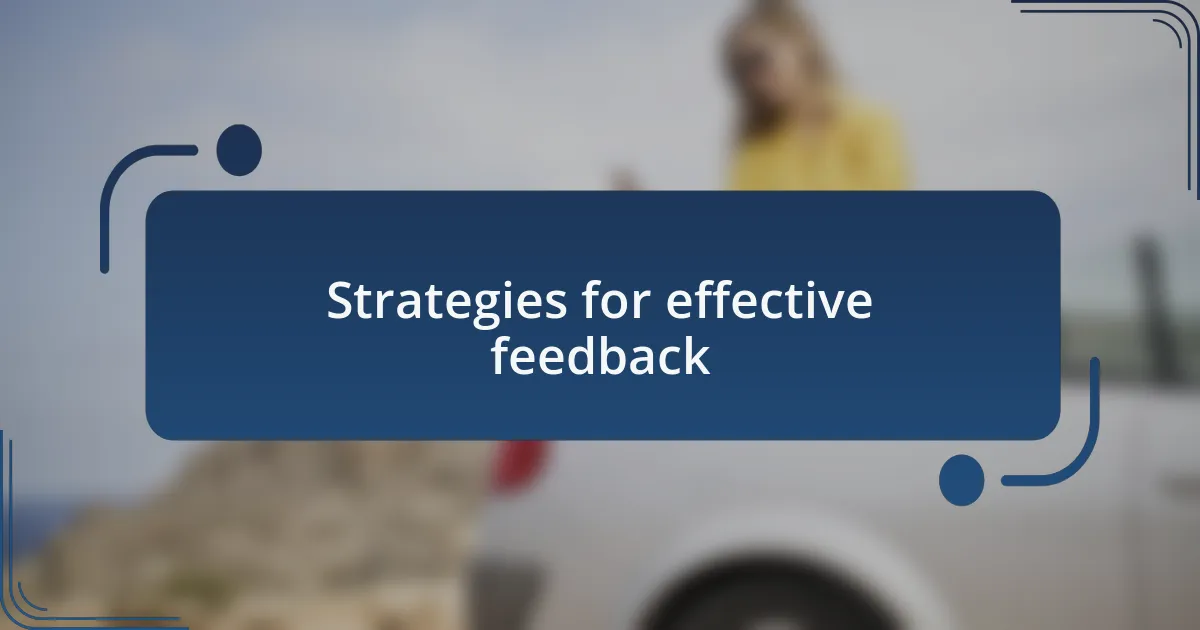
Strategies for effective feedback
One effective strategy for delivering feedback is to be timely and specific. I once had a mentor who would provide immediate, detailed feedback after meetings. That approach not only helped me understand what I did well but also pinpointed areas for improvement without the pressure of a formal review. Have you ever received feedback long after the moment has passed? It often loses its value and impact.
Creating a safe environment for open dialogue is another key strategy. I vividly remember a workshop where we practiced giving and receiving feedback openly. The atmosphere was light, yet serious; each participant felt comfortable sharing their thoughts without the fear of backlash. It struck me how much more insightful and constructive discussions became when we allowed vulnerability. Have you tried fostering such openness in your team?
Lastly, following up on the feedback is crucial for demonstrating its importance. After implementing suggestions from a recent project review, I made it a point to check in with my team members to see how they felt about the changes. Their responses were overwhelmingly positive, and it solidified the sense that their contributions truly mattered. Isn’t it rewarding when feedback evolves into real, impactful change?
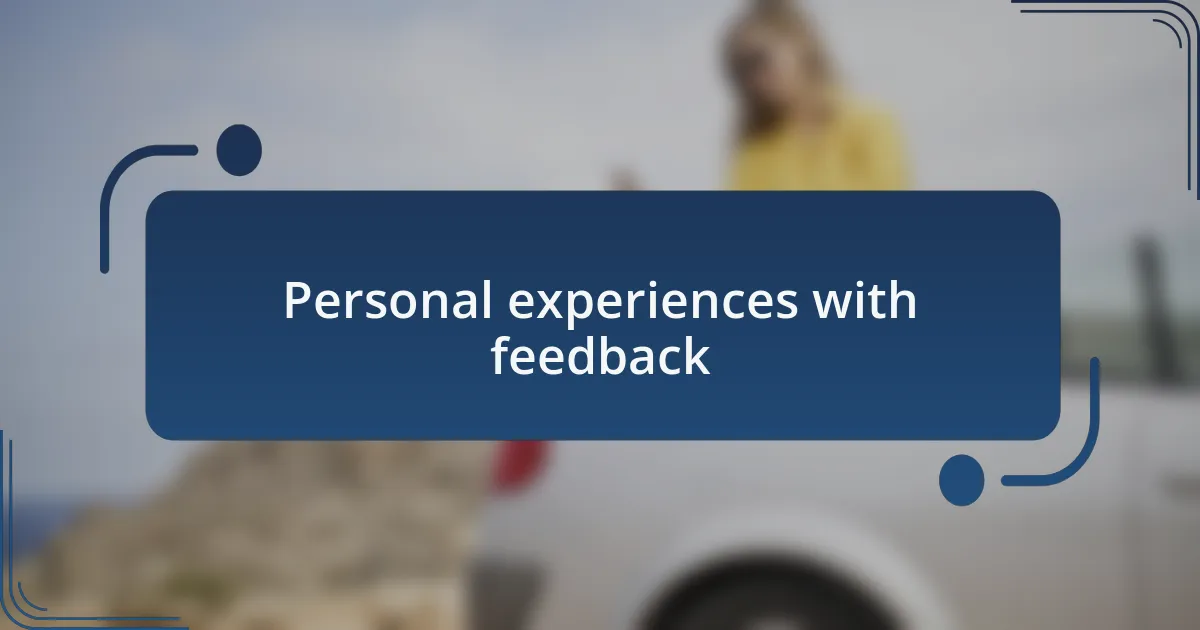
Personal experiences with feedback
Reflecting on my own journey with feedback, I remember a time when I received a particularly candid assessment from a colleague. We were working on a joint project, and after presenting our ideas, he remarked that my approach was overly complex. Initially, I felt taken aback, but as we discussed it further, I realized he was right—simplifying my ideas could lead to better understanding and collaboration. It was a crucial moment that taught me the value of accepting constructive criticism, even when it’s uncomfortable. Have you ever been challenged like that, only to find clarity on the other side?
Another experience that stands out to me involves a casual coffee chat with a peer who had insights on my communication style. She pointed out that I often spoke too quickly during presentations, likely due to nerves. At first, I was defensive, but her gentle approach made it easier to absorb her advice. Since then, I’ve practiced slowing down, and the change has not only improved how my message is received but also boosted my confidence. Isn’t it amazing how one conversation can shift our perspective so dramatically?
I’ve also experienced the power of feedback in a more unexpected setting—during a team-building retreat. We engaged in a feedback exercise that focused not just on work but also on personal attributes. It was refreshing to hear my teammates appreciate my patience and clarity, qualities I sometimes underestimated. That experience reminded me that feedback isn’t always about fixing flaws; it can also be about acknowledging strengths that we may not fully recognize in ourselves. Have you ever received feedback that surprised you in a positive way?
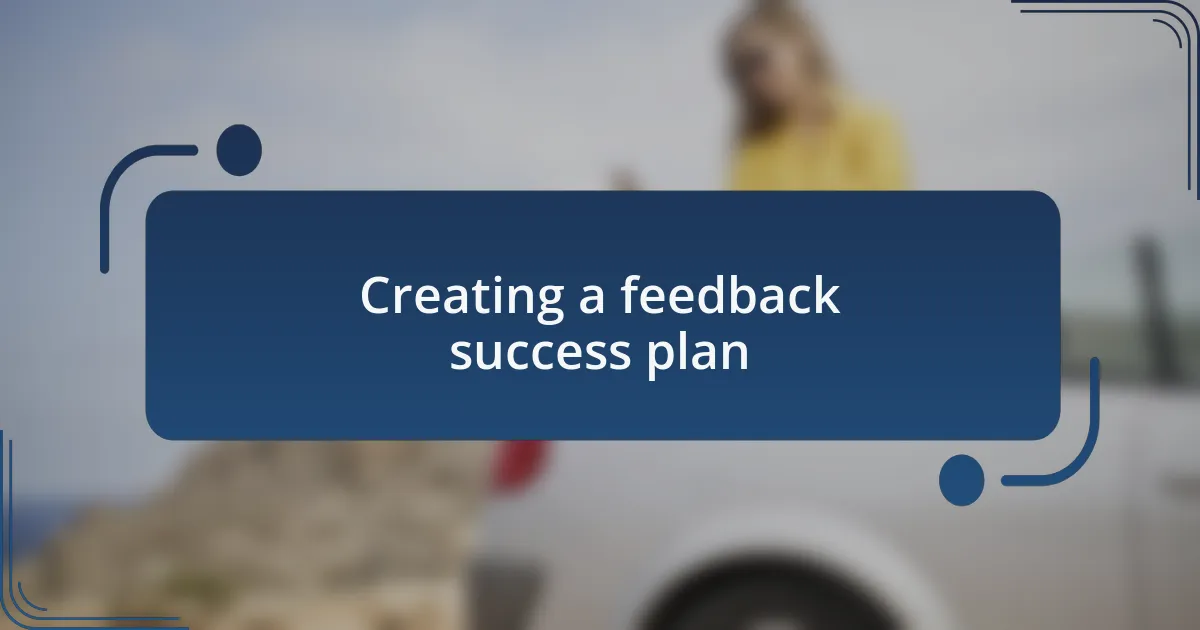
Creating a feedback success plan
Creating a feedback success plan begins with identifying your key objectives. When I first attempted to streamline my feedback process, I found it helpful to set specific goals. For instance, aiming to reduce misunderstandings in team communication led me to introduce regular check-ins. Don’t you think having clear targets gives you a road map to follow?
Next, involve those around you in the planning stage. I recall organizing a workshop where team members shared their thoughts on what effective feedback looks like. The discussions revealed common themes, such as the need for real-time feedback rather than waiting for annual reviews. Engaging others not only fosters a sense of ownership but also cultivates a culture of continuous improvement, wouldn’t you agree?
Lastly, remember to review and adapt your plan regularly. I learned this the hard way during a project where I didn’t revisit our feedback strategies mid-way. As a result, we missed opportunities to adjust our approach based on evolving dynamics. By consistently evaluating your feedback success plan, you can ensure it remains relevant and effective. How often do you reflect on your own feedback processes?
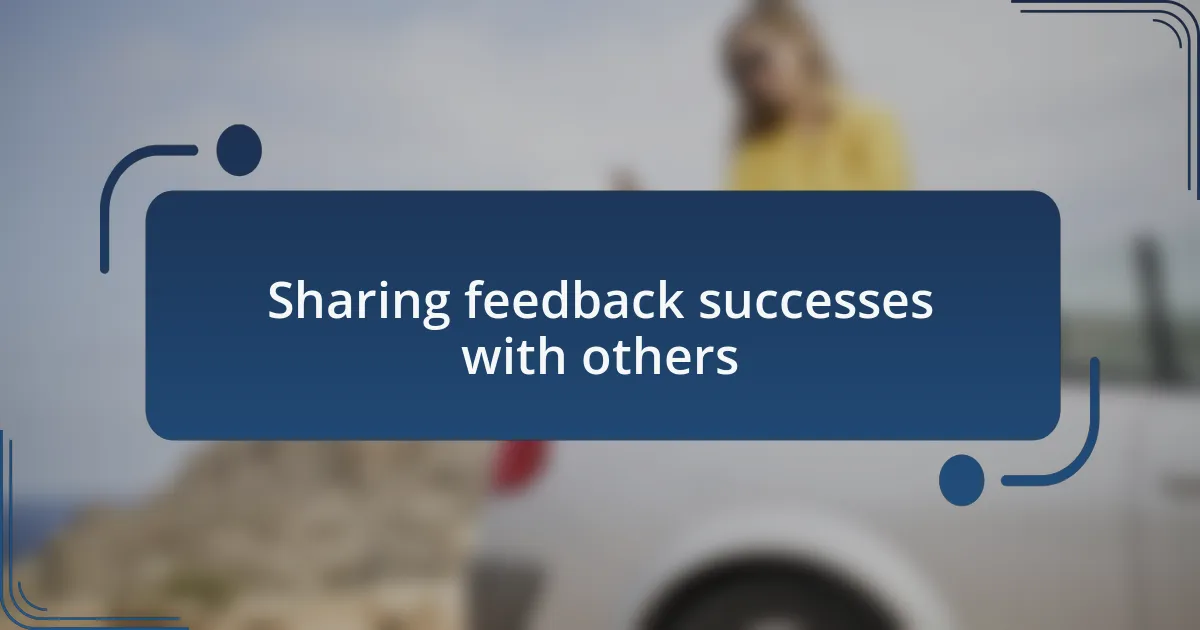
Sharing feedback successes with others
When it comes to sharing feedback successes with others, I’ve found that storytelling can be incredibly powerful. I once shared a success story from our team’s efforts during a challenging project, highlighting how constructive feedback transformed our collaboration. The moment the team recognized their contributions to that success, I could literally see the spark in their eyes. It’s a reminder that sharing these victories not only boosts morale but also reinforces the value of open communication.
I remember a specific instance when I organized a small gathering to celebrate our feedback milestones. We created a visual board depicting our journey, showcasing not just the positive outcomes but also the lessons learned along the way. I noticed how reflective discussions blossomed, allowing team members to recount their experiences and share their insights. Isn’t it fascinating how a simple gathering can nurture a culture of appreciation and continuous learning?
From my perspective, acknowledging feedback successes can serve as a motivational tool. Whether it’s through a newsletter or a quick shout-out in team meetings, I make it a point to highlight individual and group achievements. When I recognized a colleague’s initiative in implementing suggestions that led to improved efficiency, it sparked enthusiasm throughout the team. Have you ever witnessed the ripple effect of such recognition? It’s a beautiful way to encourage others to embrace feedback in their work.
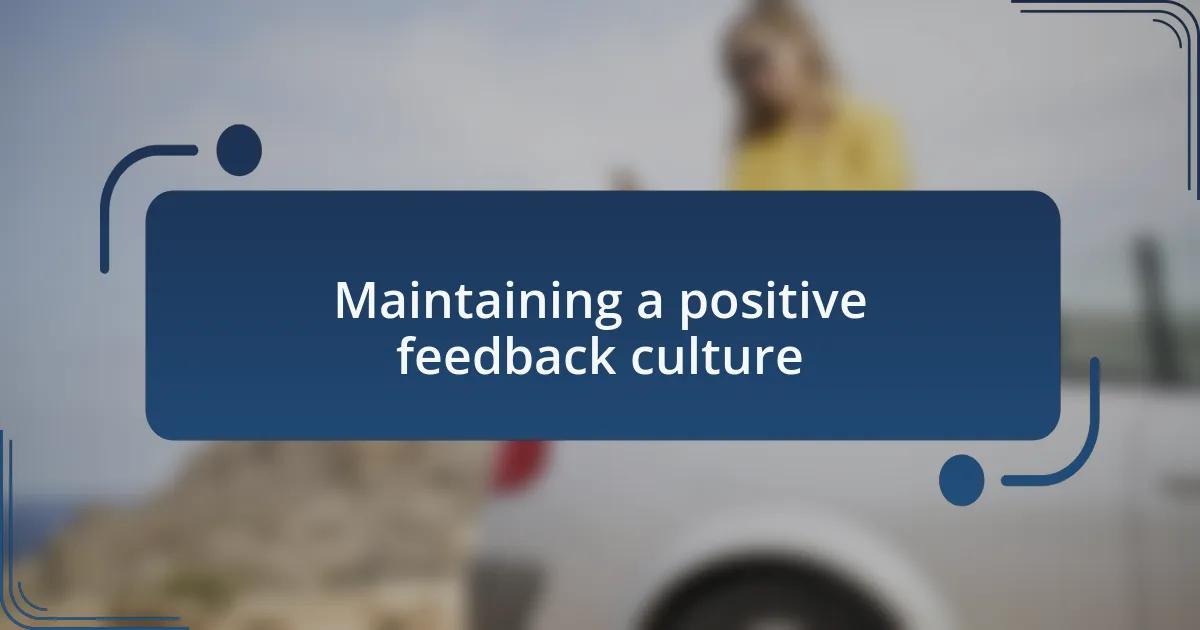
Maintaining a positive feedback culture
Creating a positive feedback culture is something I’ve actively pursued in my workplace, and it often starts with leading by example. During a recent team meeting, I took a moment to commend someone for their thoughtful input on a project proposal. The way their face lit up was a vivid reminder of how acknowledgment can elevate not just the individual but the entire atmosphere in the room. Have you ever noticed how recognition can transform the energy of a team?
I personally find that regular check-ins contribute significantly to maintaining this culture. I once initiated bi-weekly feedback sessions where we rotated who would lead the discussion, fostering a sense of shared ownership. It was amazing to witness how team members began to feel more empowered to share not just their successes, but also their struggles. This openness created a safe space for everyone to engage honestly. Isn’t it fascinating how structured conversations can break down barriers?
Sometimes, informal settings can yield the best results for reinforcing positive feedback. I remember a lunch-and-learn session where we shared not only wins but also explored how feedback shaped our learning journey. The laughter and storytelling made our bond stronger, emphasizing that growth can indeed be fun. It makes me wonder—how often do we utilize casual moments to deepen our connections with one another?